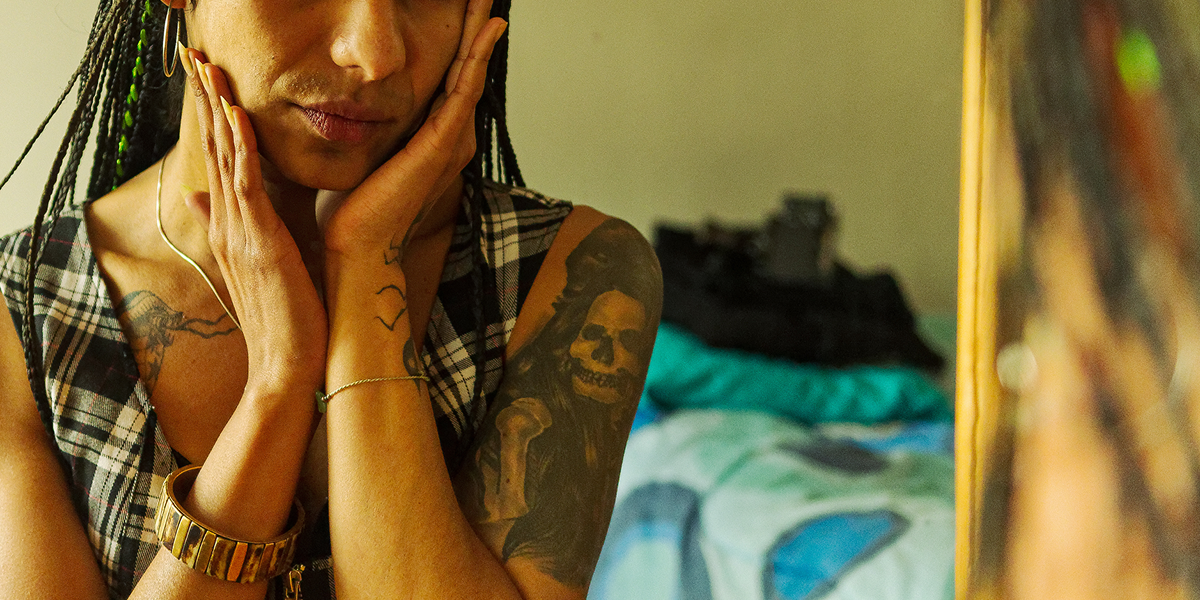It’s Wellness Vibes Week! We’re taking some time at the start of this brand new year to explore wellness culture/wElLnEsS cUlTuRe through a queer lens, specifically the kind of queer lens that you can only find at your local Autostraddle. No celery juice or vagina steaming, just some chill tips for making your spiritual, physical and mental health a little better in 2020.
It’s 2020 and we all know that ~*wE sHouLd aLl bE in tHerApY*~, and a lot of us are! Those of us who aren’t, a lot of us are very reasonably stymied by access, by our shitty health insurance, by not having health insurance at all, by not being able to find a therapist even within those systems that can actually help us. And for those of us who do have access to therapy, we can not infrequently find we’re navigating heterosexism, cissexism, white supremacy and more there too, which kind of undercuts the point. We sometimes wish our therapists had insight from actual queer people and not just theory about how to treat us more effectively – and we’re sure they do too, they want to help! That said, here’s our real-life insight and tips about how to help us get better better.








Comments
fuck what a timely article. (there’s some potentially triggering stuff to follow if you’re struggling with eating or body image issues)
I’ve been seeing the same therapist since I first started ED recovery, and I considered us as having “grown up” and learned about my gender and sexuality together. A couple of sessions ago I mentioned that it was the ten-year anniversary of getting my first binder, and how much of an affirming and lovely moment of my life that had been. Instead of believing in my joy, she told me quite offhandedly that she thinks it’s time for me to “transition” (no pun intended) away from binding, as she sees it as a form of indulging in my body issues and trying to “stay in a child’s body” instead of “moving gracefully into young womanhood” (which, WHAT the FUCK). Since then, despite repeatedly telling her otherwise, she seems to think this is our next big thing to tackle, rather than a very ordinary part of my life that I don’t see an issue with. I think her intentions are good, but needless to say I’m pretty hurt. I’ve been lucky to have someone I trusted (and could afford) for this long, but it’s probably time for me to find someone that meets me where I’m at. Smash tits and all.
That’s terrible, and must have been especially dismaying given the trust you would have built up over time. I hope you can find someone who’s a much better fit for you now.
Therapy in the eating disorder world can sometimes be incredibly glued to traditional gender roles, to the detriment of the clients in their care. You may need to find a therapist with a more general focus who has an understanding of eating disorders but isn’t focused on that area. It’s disappointing that someone who should understand and not judge would say this to you!
I’ve just started reaching out to therapists to try and find someone for the first time so I really appreciate this! Thank you for sharing! What I am concerned about is finding someone who gets queer stuff, solo stuff, poly stuff, and kink stuff. I worry about someone trying to fix things that I am happy with instead of helping me navigate a world that thinks I’m messed up, you know?
FWIW: TherapyDen.com has the most friendly search options I have found thus far.
One time a therapist asked me if I felt more like a girl or a boy.
Another time, a (different) therapist didn’t know that someone had shot up a synagogue in Pittsburgh the week after it happened, and insisted it wasn’t her job to follow the news because her job is depressing enough. (I told her I wasn’t coming back, on the spot.)
Culturally incompetent shrinks are the worst.
This is really helpful, especially Heather’s comments for me. Thanks!
My heart breaks for every queer person that doesn’t have access to a (good) therapist that needs one.
I’ve been extremely fortunate wrt my therapists-
I was fully comfortable with my previous therapist, even though she was straight and cis, that I was able to explore and figure out my gender and my sexuality.
And my current therapist (queer and cis) has been instrumental in me growing in and embracing my identities (and intersections) and communities.
And both of them view(ed) me as a whole person- not JUST my queerness, but also not seperate from it either.
I hope someday soon every queer person that needs/wants it, gets access to what I have.
Until that day, I hope they’re able to hang on and live the best lives that they’re able to.
timely fucking article! i’ve have a therapist for over 4 years who just told me she’s moving and i know that my next therapist i’m going to spend a Lot of time figuring out what perspective i want to support me. thanks for sharing!!
FWIW: TherapyDen.com has the most friendly search options I have found thus far.
Thank you for this, this article has made me start to rethink my need/desire to go to couples therapy with my wife. we definitely could use it, I just wish I knew where we could find a sitter for our kids (anyone in the North Bay up for watching our cute 3yr old twins???)
On the same sort of note of being dismissed in the medical world, when I was pregnant my obgyn asked me how I was doing and I told her I was “tired, sore, etc,” you know the general feelings of a person who is pregnant with twins. In her next breath she responded that I should “feel lucky because many women have it much worse,” as if I were complaining, as if I wasn’t just responding honestly to the question SHE HAD JUST ASKED ME. It still makes me mad thinking about how she dismissed my feelings. Lucky for me she was not the dr that performed my c-section.
Um what do you mean by “North Bay” because I’m kind of not kidding that I would babysit? Like do you mean north of San Francisco? I dunno, it’s wild offer, but DM me if you want. I’m a grad student who would love some kid-time
@bicoastal Yes North of SF! We are in the Santa Rosa area. :) Would love to meet and great regardless, I’ve been hankering to meet with other Autostraddle peeps.
Huh, I just saw a new therapist last night. She was very nice, and I hope things work out, but the first question she had after I told her that I’d had bottom surgery was “who are you going to have sex with now” which I mean let’s work our way up to that, shall we.
What she wanted to know was my sexuality. So: Therapists, don’t assume trans people suddenly change their attraction when they change their genders.
Yikes what even!
This is so timely! I’m finally looking for a therapist and I’m not really sure what to be looking out for. I’m trying to find a queer woman of colour hopefully, but I know how hard that can be. This article has definitely given me ideas on questions to ask potential therapists.
Ugh I wasn’t out even to myself and when I described not being attracted to men and finding dating them to be a miserable chore, she was very into me just continuing to give it the old college try. That I might not be straight didn’t even enter the conversation. Thankfully, I managed to admit that to myself a few months after ending therapy. I’m not saying it was her job to have that revelation for me, but I do think she should have been able to at least bring up the possibility.
It’s been a few years and I’ve considered going to another therapist, but I have a long commute and finding one who is gay friendly and in my insurance with reasonable hours sounds like a friggin nightmare.
Wait help — I’ve had several of these negative experiences but hardly any of the good ones. Like, you know, the time I told a therapist my anxiety was fixating on climate change lately and she told me she was also scared in the 60’s but she’s still alive so that proves we’re definitely going to be okay??? To say nothing of discussing my relationship stuff. Rather than continuing to search for a therapist that I feel can “handle me” (the words I say to myself) I’ve just stopped searching and lie to my family and friends that ask if I’m making progress finding someone. It’s too exhausting! And bad therapy feels kinda worse than no therapy for me. What do I do? How do I…find someone (Berkeley)? It’s a rhetorical question but it feels nice to scream into the void.
FYI: TherapyDen.com has the most friendly search options I have found thus far.
I have a great rec for you in Berkeley – add me back so that I can send you info :)
FYI: TherapyDen.com has the most friendly search options I have found thus far.
this is so amazing!
thank you especially for articulating the tendency to ‘shrink’ queer parts of our lives around shrinks that don’t feel amazing — I definitely do that and hadn’t totally identified it as such, so I really appreciated it.
Same for me.
Thanks for this article. I feel like there’s a ton of emphasis on everyone having to be in therapy and it being great and appropriate all the time, to the point where it’s almost taboo to talk about negative experiences.
I don’t go to therapy now, and I’m happier for it – I’m pretty okay at doing that kind of introspective work on my own, and at this point in my life I know more about my mental illnesses than a general therapist would (and I don’t have any interest in seeking out a specialist because the specific therapies people use for people with my problems do more harm than good for me personally.) I don’t want to take part in any emotionally intimate relationship with the power dynamic involved in therapy, and I think that’s a reasonable way to feel.
I don’t think people who still want to be in therapy should give up on it, but I do think that a lot of people who spend a lot of time in social spaces with an emphasis on healthy living are pressured into continuing to pursue talk therapy beyond what they want or need to do. If there’s anyone reading this who doesn’t get a lot out of the basic premise of talk therapy (or who only gets negative things out of it) and wishes they had permission to disengage – congrats, now you do! There are plenty of ways to be a relatively happy and relatively stable person, no matter what the people who talk the most about healthiness and recovery have to say about it.
Agreed about talk therapy – I’ve had some decent experiences, but I’m a fairly introspective person too and usually get pretty quickly to a point where I feel like I’m doing all the work myself. I have on the other hand had some really effective sessions in more somatic-based therapy, but again I know that’s not readily available to, or appropriate for, everyone.
I think when people do find something effective they want to try to solve everyone else’s problems with it, but it is important to remember that each person has their own process to go through and not everyone will respond to various kinds of treatment in the same way.
“I don’t want to take part in any emotionally intimate relationship with the power dynamic involved in therapy, and I think that’s a reasonable way to feel.” Whew!! Good point.
As a therapist for 13 years – some of these therapists are terrible at their jobs. If I was supervising them – we would be having some conversations about appropriate behavior and basic therapy skills.
Yes. “There are starving kids in other countries” is a comment I’d expect from a lazy parent, not a trained therapist.
I really appreciate this article!
Abeni, I know you don’t need telling, but the therapist who brought up starving kids in other countries is an appalling therapist. Like shouldnt-be-in-that-job appalling.
“Being sweet is a passive personality trait; being kind is a courageous and minute-by-minute choice.”
Heather! I want this on both sides of a t-shirt.